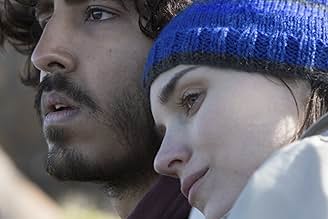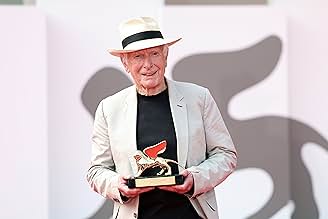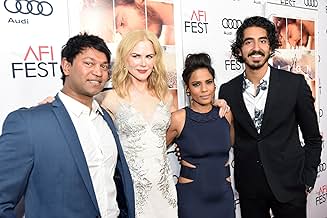Un niño indio de cinco años se pierde en las calles de Calcuta, a miles de kilómetros de su casa, este sobrevive a muchos desafíos antes de ser adoptado por una pareja en Australia. 25 años ... Leer todoUn niño indio de cinco años se pierde en las calles de Calcuta, a miles de kilómetros de su casa, este sobrevive a muchos desafíos antes de ser adoptado por una pareja en Australia. 25 años después, se dispone a encontrar a su familia perdida.Un niño indio de cinco años se pierde en las calles de Calcuta, a miles de kilómetros de su casa, este sobrevive a muchos desafíos antes de ser adoptado por una pareja en Australia. 25 años después, se dispone a encontrar a su familia perdida.
- Dirección
- Guionistas
- Elenco
- Nominado a 6 premios Óscar
- 59 premios ganados y 110 nominaciones en total
- Police Official
- (as Koushik Sen)
- Liluah Teacher
- (as Uday Shankar Paul)
- Dirección
- Guionistas
- Todo el elenco y el equipo
- Producción, taquilla y más en IMDbPro
Argumento
¿Sabías que…?
- TriviaTo internalize her character, Priyanka Bose went to Madhya Pradesh to meet Kamla Munshi, the mother her character was based on: "My questions were basic and just by meeting her, I could tell how hard her life has been. I got down on my knees and hugged her and thanked her for her courage." When meeting Munshi she was told that she was declared crazy by many villagers in the small town for years, as she never gave up hope that her son would return one day.
- ErroresAt 1:06:21, Saroo is seen using Samsung Galaxy S in 2008, but the model was released in 2010.
- Citas
Saroo Brierley: I'm sorry you couldn't have your own kids.
Sue Brierley: What are you saying?
Saroo Brierley: We... we... weren't blank pages, were we? Like your own would have been. You weren't just adopting us but our past as well. I feel like we're killing you.
Sue Brierley: I could have had kids.
Saroo Brierley: What?
Sue Brierley: We chose not to have kids. We wanted the two of you. That's what we wanted. We wanted the two of you in our lives.That's what we chose.
[pause]
Sue Brierley: That's one of the reasons I fell in love with your dad.
[pause]
Sue Brierley: Because we both felt as if... the world has enough people in it. Have a child, couldn't guarantee it will make anything better. But to take a child that's suffering like you boys were. Give you a chance in the world. That's something.
- Créditos curiososAfter the final credits, there's an earlier shot with the boys on the train tunnel and the credits "In loving memory of Guddu".
- Versiones alternativasThe Extended Australian Edition runs approx. 12 minutes longer.
- Bandas sonorasAaja Nindiya Aaja Nainan Beech Sama Ja
Written by Khayyam
(Saregama India/Mushroom Music)
Performed by Lata Mangeshkar
Licensed courtesy of Saregama India
This true story is told in two parts and filmed across two continents. Five year-old Saroo is a ragamuffin sidekick to his older brother Guddo, two poor boys who support their family by stealing coal and scavenging trains in their West Bengal village. They become separated one night and Saroo finds himself alone on a train heading to the other side of India. He he joins hordes of homeless children who must fend off predators while begging to survive. Eventually he is placed in a crowded orphanage, then adopted by two big-hearted and childless Tasmanians, Sue (Nicole Kidman) and John (David Wenham). Twenty years on, Saroo (Dev Patel) begins to have memory flashbacks of his native land. As they increase in intensity, he becomes obsessed with finding his family. With some luck and Google maps, the story comes full circle.
There is so much that makes this film stand out. The storytelling is more than engaging: it is so captivating that the two-hour run-time feels like an hour. Acting performances are outstanding: Nicole Kidman is at her best while the five year-old Saroo (Sunny Pawar) is the heart of the film and Dev Patel its soul. The cinematography is brilliant, especially the filming in India. The camera-work is both expansive and intimate, shifting often from sweeping aerial panoramas of mountainous Indian countryside and tranquil Tasmanian waterways to narrow winding alleys, village markets, and the inner-world of Saroo's turmoil. Some of the most powerful scenes are shot from the eye-level of a terrified lost boy jostled by masses of humanity and the close-ups of Saroo's painful face desperate to know home. The colour palette is exotic, sound track emotionally intense, and the directing finds a rhythm that is almost orchestral.
This film offers an immensely satisfying cinematic experience: visually stunning, narratively powerful, and an emotional whirlwind. It comes at the end of a very mixed year for Australian film, with some of the world's finest produced but many that are less than inspiring. Lion is one of those films that will appeal to everyone and it has a very long after-taste. It easily tops my film year.
- CineMuseFilms
- 21 dic 2016
- Enlace permanente
Selecciones populares
Everything New on Netflix in January
Everything New on Netflix in January
- How long is Lion?Con tecnología de Alexa
Detalles
- Fecha de lanzamiento
- Países de origen
- Sitios oficiales
- Idiomas
- También se conoce como
- Lion
- Locaciones de filmación
- Ganesh Talai, Khandwa, Madhya Pradesh, India(The home of the Saroo)
- Productoras
- Ver más créditos de la compañía en IMDbPro
Taquilla
- Presupuesto
- USD 12,000,000 (estimado)
- Total en EE. UU. y Canadá
- USD 51,738,905
- Fin de semana de estreno en EE. UU. y Canadá
- USD 123,360
- 27 nov 2016
- Total a nivel mundial
- USD 140,853,810
- Tiempo de ejecución1 hora 58 minutos
- Color
- Mezcla de sonido
- Relación de aspecto
- 2.39 : 1
Contribuir a esta página









































